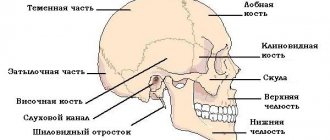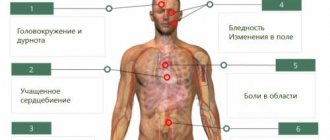In pursuit of a slim figure, the desire to thoroughly cleanse the body, or during fasting, many people go to extremes and stop eating food. An incorrect approach to fasting, ignorance of the physiological basis of metabolic reactions, as well as the rules for entering and exiting such a regime lead to serious health problems, one of which is hungry fainting. Loss of consciousness is not a disease, but the result of a metabolic disorder in conditions of insufficient supply of nutrients, oxygen and energy.
What is fainting
Fainting is a loss of consciousness that lasts for a short time. In medicine, this is defined as a syncope (“syncope” in Greek means “chopping off”). It is not a disease in itself, but always indicates a sharp problem in the body. A person loses consciousness due to the fact that the central nervous system does not receive enough oxygen. Under conditions of hypoxia, the brain “turns off” and fainting occurs.
Development mechanism
Slightly different in each case. For example:
- in case of fainting caused by heart rhythm disturbances (certain types of arrhythmias), there is less blood in the cerebral vessels, since “incorrect” heart contractions pump a smaller volume;
- with orthostatic fainting, which develops when a person stands up abruptly, the smaller volume of blood is due to a change in body position to which the vessels have not yet had time to adapt;
- with fear or anxiety, a person begins to breathe more often, which causes a decrease in carbon dioxide pressure in his blood; because of this, the brain vessels dilate;
- Abdominal pain is also a cause of loss of consciousness. In this case, the brain vessels are less filled with blood due to excessive stimulation of the vagus nerve.
The general meaning - an imbalance between the capacity of a brain blood vessel and the volume of blood contained in it - is observed in all cases.
Causes
1. Heart diseases in which the volume of blood expelled per contraction decreases:
- arrhythmias;
- myocardial infarction;
- angina pectoris;
- aortic stenosis;
- stenosis of the pulmonary artery opening.
2. Diseases of the autonomic nervous system, in which the normal regulation of blood vessels is disrupted. These include the following types of fainting:
- developed when standing up abruptly;
- when swallowing.
3. Reduced oxygen concentration in the blood with:
- chronic anemia;
- being at a height;
- working in a stuffy room.
4. Impaired patency of cerebral vessels due to the deposition of atherosclerotic plaques in them.
5. Acute intracranial hypertension, as a result of which the vessels cannot “push” the required volume of blood to the brain, the causes of which are injury, hemorrhage, or tumor.
6. Decrease in blood glucose levels (hunger fainting).
7. Poisoning with alcohol, carbon monoxide.
8. Decrease in the volume of the liquid part of the blood.
9. For mental disorders.
10. Due to taking medications that lower blood pressure.
In healthy people, fainting can occur when working in a stuffy room, at height, or when standing for a long time in hot conditions. In children and adolescents, vasovagal syncope often occurs, which develops due to insufficient maturity of the autonomic nervous system.
They develop in response to provoking factors: fear, anxiety, overwork, hunger, injury.
4. Impaired patency of cerebral vessels due to the deposition of atherosclerotic plaques in them.
1. Presyncope, which lasts from 4 to 90 seconds. During this period, cerebral blood flow is already reduced, but the body tries to compensate for this. It manifests itself as one of the following symptoms:
- discomfort;
- “fog” before the eyes;
- heart rhythm disturbance;
- nausea;
- anxiety, fear;
- lump in the throat.
2. Actually fainting, that is, loss of consciousness for a period of 6 seconds to a minute. It is characterized by a low reversible level of cerebral blood flow and, accordingly, metabolism. In addition to the loss of spontaneous activity, the following symptoms are characteristic:
- narrow pupils;
- pallor of the skin and mucous membranes or their bluish discoloration;
- blood pressure is reduced;
- decreased muscle tone;
- pulse weak and rare;
- shallow breathing.
3. Post-syncope period - a period of time during which brain metabolism is restored. It is characterized by activation of the sympathoadrenal system, which is manifested by symptoms such as fear, increased heart rate and breathing.
For the previous period of decreased cerebral blood flow, a person “pays” with headache, weakness, and dizziness.
Physiological causes of loss of consciousness from hunger
What causes lack of oxygen and impaired consciousness due to insufficient nutrition? Most often, a person loses consciousness due to a lack of glucose in the blood. Prolonged fasting leads to a drop in sugar levels, which causes hypoxia of the central nervous system. In addition, when there is a lack of food, waste and toxins enter the blood. Once in the brain, these harmful substances cause loss of consciousness.
Most often, syncope occurs due to a lack of nutrients in the body when a person does not have enough food. But there are other reasons for hungry fainting:
- Often this condition is observed in people who are on a diet with a monotonous diet (for example, they eat only dairy products or fruit juices). This leads to an unbalanced diet, and the body begins to draw missing substances from internal resources. As a result, brain cells experience hypoxia.
- A person may eat adequately, but often experience stressful situations or experience increased physical activity. This requires additional energy expenditure, the body begins to intensively consume kilocalories. All systems and organs have to work with increased load to provide the brain with oxygen. However, this is not always possible, and then the central nervous system turns off and fainting occurs.
- Irregular eating, when a person eats dry food or takes long breaks between meals, can also lead to temporary loss of consciousness. In this case, a discrepancy arises between the intake of calories, carbohydrates, fats and the body’s energy expenditure.
- In diseases of the gastrointestinal tract, the absorption of nutrients is impaired, which can cause loss of consciousness from hunger, even if a person does not deny himself food.
- Systematic abuse of sweet carbonated drinks can cause fainting. Water with gas and sweeteners leaches beneficial microelements from the body, and this leads to a lack of nutrients and loss of consciousness.
- Anorexia nervosa often causes fainting from lack of food. With this disease, appetite is sharply reduced, and the patient consumes very little food for a long time.
Sometimes a person loses consciousness by abruptly changing body position, for example when standing up. This can also be a type of hungry fainting if the body does not receive enough nutrients.
Causes
Doctors identify several causes of hungry fainting. Here are the most typical of them:
- Improper and unbalanced diet are the main causes of hungry fainting. For example, it occurs when eating one product (most often fruits or fruit juices). If the correct ratio of proteins, fats and carbohydrates is not maintained, the body will not be able to store energy. Insufficient supply of energy and nutrients to the brain are the main causes of hungry fainting. In addition, this type of nutrition depletes nerve cells.
- Decreased cardiac output (angina attacks, cardiac arrhythmias, aortic stenosis).
- Defects in the nervous regulation of capillaries (rapid changes in body position).
- Hypoxia.
- Decreased blood pressure when the body does not adapt to the rapid change in blood flow through the capillaries.
- Diseases leading to heart rhythm disturbances. The human body feels oxygen deficiency, which provokes fainting.
- Dilatation of muscle blood vessels as a result of physical activity.
- A decrease in the amount of circulating blood, which is possible with blood loss or dehydration (diarrhea, excessive urination, sweating).
- When swallowing food, coughing or urinating, which indicates a dysfunction of organs in these systems.
- Hyperventilation of the lungs with anemia, low blood sugar or carbon dioxide.
- Micro-strokes in elderly people due to decreased blood supply to certain segments of the brain.
- Dehydration.
- Diabetes.
- Parkinson's disease.
- Vascular disorders in the extremities.
- Medicines that affect blood pressure.
- Brain hemorrhages.
- Migraine-like conditions.
- Pre-stroke conditions.
- Heart rhythm abnormality: either fast or slow.
- Aortic stenosis (dysfunction of the heart valves).
- High pressure in the arteries or capillaries.
- Cardiomyopathy.
- Aortic dissection.
- Epileptic seizures, which are associated with the functioning of the brain.
After how many days of fasting does fainting occur?
Patients practicing therapeutic fasting are interested in how quickly fainting occurs when they completely refuse food. It is difficult to answer this question unambiguously, since the capabilities of the human body are individual. Some people can go several days without eating without experiencing syncope. Others lose consciousness even with a slight disruption of their usual diet.
Here a lot depends on the person’s physique. Thin people have low fat reserves. They experience hungry fainting after 1 day of complete refusal to eat. Dense and overweight people may lose consciousness on the third or fourth day of fasting, since at first the body will draw nutrients from its own reserves.
Differences between male and female fainting
Fainting states of the male and female half of the population are united by the fact that they can occur both for the same reasons and for different ones.
The same root causes of fainting include:
- stress;
- high fatigue;
- the sight of blood and other sights that cause hostility in a person;
- staying in one position for a long time;
- panic attacks;
- poor nutrition;
- long ride.
The main distinguishing hunger fainting between men and women is pregnancy, when the fetus takes away most of the nutrients from the mother, resulting in fainting conditions. In men, such conditions are associated with wearing ties, bow ties and shirts with pressing buttons, which compress and irritate the carotid sinus.
Presyncope
Usually a person does not lose consciousness suddenly. A few minutes before syncope, your health sharply worsens, and the first signs of hungry fainting occur:
- dizziness;
- cold sweat;
- nausea;
- fog;
- weakness;
- sensation of noise and ringing in the ears.
These symptoms indicate that the brain does not have enough oxygen, and soon the body will “turn off” the central nervous system. Then the person develops black spots and blurred vision, and the pupil stops responding to light. The skin turns pale and becomes covered in sweat. Approximately 20 seconds after visual disturbances, hungry fainting begins.
Dangerous consequences of fainting
The most common consequences of hungry fainting include injury from a fall. The head, arms or legs may be affected. The most dangerous is a concussion.
Frequent repetition of fainting conditions threatens with progressive arachnoiditis, when the arachnoid membrane of the brain becomes inflamed. Symptoms include severe pain in the head and various memory disorders.
If the necessary nutrients do not enter the body for a long time, the nutrition of the brain is disrupted! This may cause:
- reduction or complete loss of the ability to memorize, retain and reproduce information;
- frequent mood swings, changes in emotional background;
- lack of concentration;
- decreased ability to work, and in some cases its complete loss;
- constant headaches.
Symptoms of loss of consciousness during hunger
Syncope from lack of food usually does not last long. In this case, the following symptoms of hungry fainting are observed:
- Weakness gradually increases, which turns into loss of consciousness.
- A person stops reacting to the environment and stimuli; he has no reflexes.
- Muscle tone is sharply reduced.
- Blood pressure drops and heart rate decreases. A weak pulse is heard.
- Involuntary release of urine and feces is possible.
This state usually lasts no more than 20 seconds; a person completely recovers from fainting within 4 to 5 minutes.
Stages
Based on the severity of fainting conditions, it is customary to distinguish three main conditions:
- Weak degree, which is characterized by the manifestation of primary signs of fainting, such as pale skin, dizziness, blue tint to the lips, weakness, lack of coherent speech and coordination of actions.
- The stage of fainting or severe degree is accompanied by a decrease in heartbeat and breathing, in addition, the person feels everything around, but cannot react to it. Fainting lasts several seconds.
- The final degree is super-strong, in which there is no breathing or pulse, the skin becomes an unnatural blue color, the person is completely separated from the outside world and is deprived of memories of things that happened. This condition is called imaginary death.
The final stage of all stages is the post-fainting stage, which is characterized by the rehabilitation of brain function and the activation of the sympathetic system, which increases heart rate and breathing.
First aid
It is necessary to provide first aid as soon as possible in case of hungry fainting. Syncope itself is not dangerous. But falling while losing consciousness can lead to injury. In addition, residual neurological impairment is possible due to brain hypoxia during hungry syncope. What to do if a person falls and lies unconscious due to lack of nutrition? The following actions need to be taken:
- All clothing on the patient should be unbuttoned to ensure an influx of oxygen.
- The patient should be placed so that the legs are higher than the body.
- The head is turned to the side so that the tongue does not sink in and block the airway.
- Then you need to let the cotton wool soaked in ammonia smell. If there is no such medicine, then you can rub your temples vigorously with a solution of vinegar or cologne. You can also help the patient by pressing forcefully on the area of the face between the nose and upper lip.
- As soon as the person regains consciousness, he should be given sweet tea or coffee to drink. After 30 minutes the patient must be fed.
Hungry fainting in children
Conditions become quite disturbing when fainting occurs in children. Moms want to know why this happens to their children, as well as what to do in such situations. Let's try to figure it out.
The cause of fainting in a child may be:
- Emotional turmoil.
- Hunger.
- A stuffy room in which the child spent time in a standing position.
- Strong pain.
- Frequent deep breathing.
- Blood loss.
- Infectious diseases.
- Disturbances in the functioning of the ganglion nervous system.
- Low blood pressure.
- Quickly change body position from lying to standing.
- Brain injuries.
- Disturbance of the myocardial conduction system.
- Atrioventricular block (Morgagni-Adams-Stokes syndrome), which is accompanied by seizures, fainting, bluish skin and pallor. It often comes at night and goes away on its own.
What can parents do if their child faints?
- Place the baby on the bed.
- Remove the pillow from under your head and raise your legs 30°.
- Provide fresh air and its flow to the body: unbutton tight clothing, remove it from your throat, open a window, etc.
- Bring to consciousness with various irritants: mother’s perfume, ammonia, splashes of cold water or rubbing the ears.
When the baby regains consciousness, you need to let him lie down for 10-20 minutes, then give him sweet tea.
What not to do if you faint from hunger
The most common mistake in cases of hungry fainting is eating a lot of food soon after losing consciousness. It seems to others that if a person has been without food for a long time, then he should be fed heavily. This is a rather dangerous misconception. Overeating after fasting can cause gastrointestinal obstruction.
After losing consciousness due to hunger, a person can be given food only after half an hour. Food should be light, its quantity should not be too plentiful. It must be remembered that the patient’s stomach cannot digest a large mass of food after starvation.
Hypoglycemia
Hypoglycemia is a condition similar to fainting due to hunger. It develops in patients with diabetes due to an overdose of insulin. As a result, a person's blood glucose levels drop sharply. He experiences symptoms such as a strong feeling of hunger, increased sweating, weakness, and nausea. In general, the symptoms of hypoglycemic syncope are similar to the symptoms of loss of consciousness from hunger.
When hypoglycemia approaches, it is necessary to give the patient any sweets: candy, glucose tablets, a piece of sugar. If this condition continues for more than 10 minutes, then you must call a doctor.
Prevention
If a person has a tendency to faint, then too strict diets are contraindicated for him. It is necessary to avoid fasting days, a diet with monotonous food, and especially complete fasting.
While following a weight loss diet, you should not make sudden movements or expose yourself to physical and mental stress. You should not drink sweet carbonated drinks in large quantities. If a person has to observe severe dietary restrictions, then it is useful to always have candy or chocolate with him. This will help avoid deterioration in health and fainting from malnutrition.
Preventive actions
As a rule, it is easier to prevent any pathology than to treat the consequences. This law is no exception for hungry fainting. Preventive measures consist of following the following instructions.
Complete fasting is prohibited . Due to the fact that fainting is provoked by a lack of useful elements, it is important to keep your menu balanced and eat at least 5-6 times a day.
No one prohibits diets, however, the diet should be varied, with sufficient carbohydrates, proteins and fats. In addition, it is best to carry out the weight loss process carefully and under the supervision of a specialist.
Throughout the diet, it is recommended to avoid any sudden movements (running, throwing your head back). When you feel unwell, sweets help a lot, so, for example, a bar of chocolate is always convenient to carry with you.
If prevention does not bring the desired result, and hungry fainting occurs with a certain frequency, the surest way to avoid the development of pathological processes is to consult a doctor.
Presyncope, as well as loss of consciousness itself, are quite dangerous phenomena. They can “knock a person off track” and negatively affect his usual rhythm of life. To prevent serious consequences of hungry fainting, specialized medical care and timely therapy are required.











